Drs. Ravichandran and Kipnis Featured in Outlook (Links to an external site)
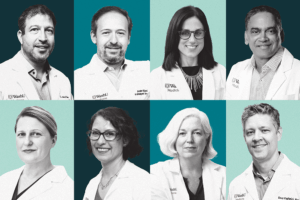
Department of

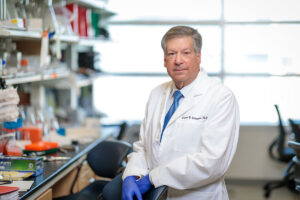


Welcome to the Department of Pathology & Immunology at WashU Medicine – an institution with more than 100 years rich history in surgical pathology, laboratory medicine, molecular diagnostics, and immunology research. Whether you are a patient, health care provider, industry partner or prospective trainee, you will find helpful information here in our newly designed website. […]
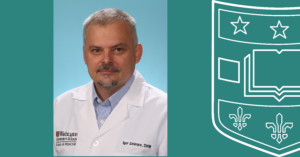
For this Faculty Feature, we spoke with Igor Smirnov, D.V.M. His main interest is in developing animal models of traumatic and degenerative injuries of the nervous system to assess the role of the immune system during normal brain function, after an injury, and during the course of a neurodegenerative diseases. Tell us about your background. […]
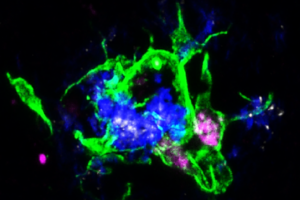
Alzheimer’s disease starts with a sticky protein called amyloid beta that builds up into plaques in the brain, setting off a chain of events that results in brain atrophy and cognitive decline. The new generation of Alzheimer’s drugs — the first proven to change the course of the disease — work by tagging amyloid for […]
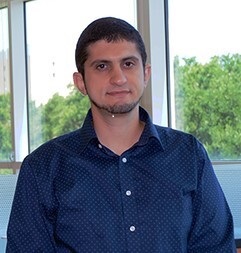
Dr. Ammar Abdelrahman, a post-doctoral researcher in the lab of Dr. Kodi Ravichandran, has received a one-year grant from the Knights Templar Eye Foundation for his project “Targeting Retinal Glial Efferocytosis as a Novel Intervention Strategy in Retinopathy of Prematurity.”

Jeffrey I. Gordon, MD, has been awarded the George M. Kober Medal from the Association of American Physicians in recognition of his outstanding contributions to the field of gut microbiome research. Gordon, director of the Edison Family Center for Genome Sciences & Systems Biology at Washington University School of Medicine in St. Louis, is considered to be […]
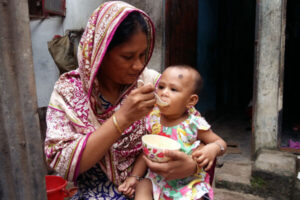
A new type of therapeutic food specifically designed to repair the gut microbiomes of malnourished children is superior to standard therapy in promoting growth, according to the results of a proof-of-concept clinical trial conducted in Bangladesh.
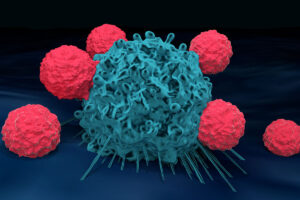
The Zika virus that ravaged the Americas, leaving many babies with permanent brain damage, may have a silver lining. The virus can activate immune cells to destroy an aggressive brain cancer in mice, giving a powerful boost to an immunotherapy drug and sparking long-lasting immunological memory that can ward off tumor recurrence for at least […]

The Department of Pathology & Immunology is excited to welcome our newest residents and fellows. For every graduating medical student, Match Day is the next step in their career to working as a doctor and we are thrilled that these residents and fellows have chosen our department to continue their training. Click here to meet […]
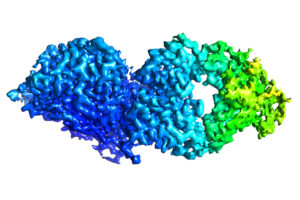
Researchers have identified two antibodies that protect mice against lethal infections of influenza B virus, report scientists at Washington University School of Medicine in St. Louis and Icahn School of Medicine at Mount Sinai. Together with an antibody that targets the other major kind of influenza viruses that infect people — influenza A — these […]
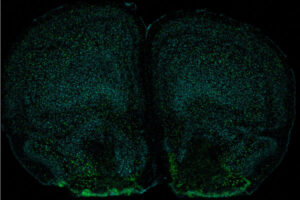
New research at Washington University School of Medicine in St. Louis helps illuminate a surprising mind-body connection. In mice, the researchers found that immune cells surrounding the brain produce a molecule that is then absorbed by neurons in the brain, where it appears to be necessary for normal behavior.
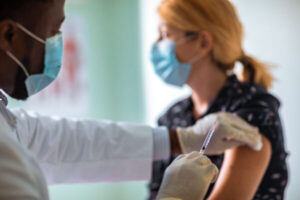
Flu season comes around like clockwork every year, and sooner or later everyone gets infected. The annual flu shot is a key part of public health efforts to control the flu, but the vaccine’s effectiveness is notoriously poor, falling somewhere from 40% to 60% in a typical year.
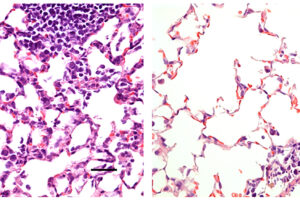
Scientists at Washington University School of Medicine in St. Louis have developed a vaccine that targets the SARS-CoV-2 virus, can be given in one dose via the nose and is effective in preventing infection in mice susceptible to the novel coronavirus. The investigators next plan to test the vaccine in nonhuman primates and humans to […]
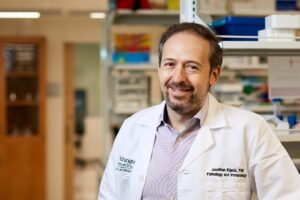
As the brain reigns supreme over the human body, the immune system works 24/7 to defend the body from foreign invaders. For decades, however, the brain and the immune system were thought to operate independently of one another. But a growing body of evidence suggests the two are intimately connected in keeping the body healthy.
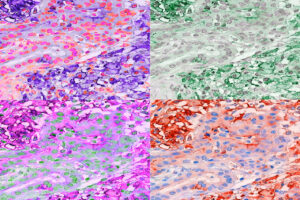
Immunotherapy has revolutionized cancer treatment by stimulating the patient’s own immune system to attack cancer cells, yielding remarkably quick and complete remission in some cases. But such drugs work for less than a quarter of patients because tumors are notoriously adept at evading immune assault.
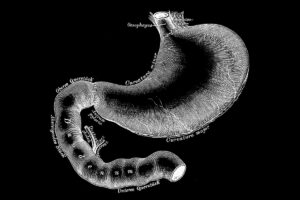
Many children treated for childhood malnutrition in developing countries never fully recover. They suffer from stunted growth, immune system dysfunction and poor cognitive development that typically cause long-term health issues into adulthood.
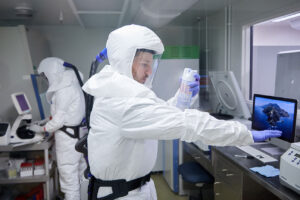
The global effort to quickly develop drugs and vaccines for COVID-19 has been hampered by limited numbers of laboratory mice that are susceptible to infection with SARS-CoV-2, the virus that causes COVID-19. Now, researchers at Washington University School of Medicine in St. Louis report they have developed a mouse model of COVID-19 that replicates the […]

Work from the lab of Jeffery Gordon, MD was recently featured in Science as a runner up for Breakthrough of The Year. This title is awarded yearly by the journal Science to recognize significant discoveries or developments in scientific research. The journal highlighted work by Arjun Raman, MD, PhD (PGY3 Clinical Pathology Resident) and others […]
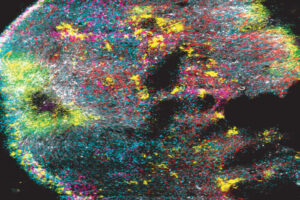
Cancer immunotherapy drugs trigger the body’s immune system to attack tumors and have revolutionized the treatment of certain cancers, such as lymphoma, lung cancer and melanoma. Yet, while some patients respond well to the drugs, others don’t respond at all. Cancer immunologists want to change that.
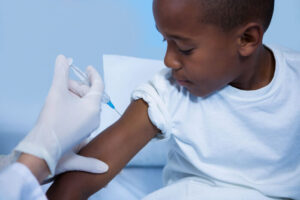
Researchers have found an antibody that protects mice against a wide range of lethal influenza viruses, according to a study from Washington University School of Medicine in St. Louis, Icahn School of Medicine at Mount Sinai in New York City, and Scripps Research in La Jolla, Calif. The antibody could serve as a template to […]
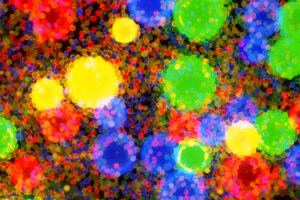
Certain human gut microbes with links to health thrive when fed specific types of ingredients in dietary fibers, according to a new study from Washington University School of Medicine in St. Louis.
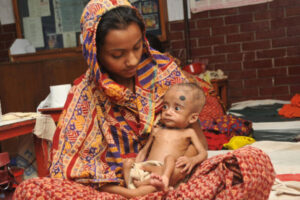
A new type of therapeutic food, specifically designed to repair the gut microbiomes of malnourished children, is superior to standard therapy in an initial clinical trial conducted in Bangladesh.
Two physician-scientists at Washington University School of Medicine in St. Louis are among the 100 new members and 25 foreign associates elected to the National Academy of Sciences this year.
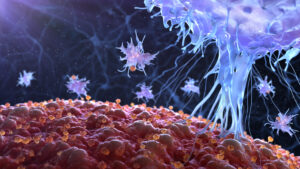
Eynav Klechevsky, assistant professor of pathology and immunology and Amit Pathak assistant professor of mechanical engineering & material science in the McKelvey School of Engineering at Washington University were awarded a three-year, $610,000 Trailblazer Award, from the National Institutes of Health’s National Institute of Biomedical Imaging and Bioengineering. This award provides funding to continue their […]
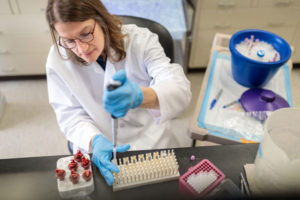
People with autoimmune diseases such as psoriasis, lupus and rheumatoid arthritis are at high risk of developing cardiovascular disease, even though none of these conditions seem to target the cardiovascular system directly. Now, researchers at Washington University School of Medicine in St. Louis believe they have begun to understand the link between the two.

Jeffrey I. Gordon, MD, of Washington University School of Medicine in St. Louis, has received the 2018 Copley Medal from the Royal Society in Britain. He is being honored for his studies of human gut microbial communities, which have led to a fundamental shift in the way scientists understand the relationship between microbes, health and […]
Nearly $3.9 million in grants awarded to faculty in Immunobiology and Laboratory & Genomic Medicine Carey-Ann Burnham, Ph.D., Associate Professor of Pathology and Immunology, of Pediatrics, and of Molecular Microbiology, and Medical Director, Clinical Microbiology Laboratory, received a five-month $10,568 grant from the National Institutes of Health, entitled “A Cloud-Based WGS Platform for Routine Surveillance […]
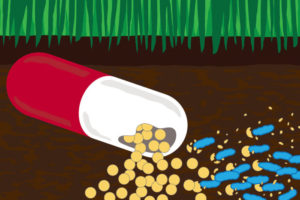
Gautam Dantas, PhD is senior author on a study showing antibiotics in the environment contribute to drug resistance.
A study lead by Maxim Artyomov, PhD shows that a compound derived from the body’s own immune cells can treat psoriasis in mice and holds promise for other autoimmune diseases.
Virus infects rare intestinal cells in mice; findings point to therapeutic strategy
Senior author Michael Diamond, MD, PhD reports that killing gut bacteria with drugs weakens the immune response
Pledges commitment to basic science research
Two projects from Pathology & Immunology were selected this year to receive funding though the Leadership in Entrepreneurial Acceleration Program (LEAP). They include: Targeting type III interferon for the treatment of multiple sclerosis This project is a potential new biomarker of progressive forms of multiple sclerosis (MS) that, when targeted, can prevent axonal injury and […]
Jonathan Miner, MD, PhD, affiliated faculty in the department, is the leading investigator of the study that shows viruses related to Zika may share its ability to harm fetuses.
Nearly $8 million in grants awarded to faculty in Immunobiology and Laboratory & Genomic Medicine. Congratulations to all! Gautam Dantas, PhD, Associate Professor of Pathology & Immunology, of Biomedical Engineering, and of Molecular Microbiology, received a three-year $1,143,750 award from the Department of Energy, entitled “Systems Engineering of Rhodococcus Opacus to Enable Production of Drop-in […]
The AAI Council announced that Eugene Oltz, PhD will serve a five-year term as the Journal’s editor-in-chief, starting July 1, 2018. Dr. Oltz is a Professor and Vice-Chair of Faculty Development in the Department of Pathology & Immunology.
Crouch received Course Master of the Year from the class of 2019; Virgin, Edelson received Distinguished Service Awards. Congratulations to all!
Multiple faculty and post-docs receive grants totaling nearly $8 million. Congratulations to all! Maxim Artyomov, PhD, Assistant Professor of Pathology & Immunology and of Biomedical Engineering, received a five-year $1,906,250 grant from the National Institutes of Health, entitled “Itaconate as Metabolic Regulator of Inflammation”. Takeshi Egawa, MD, PhD, Associate Professor of Pathology & Immunology, received […]
The Department of Pathology & Immunology United Way campaign will run from October 1st to October 31st. Faculty, staff and students can contribute through HRMS or through pledge cards throughout the campaign. To thank you for your participation, the department is sponsoring raffles and a cookie social. Don’t miss your chance to win a coffee […]
Employees are encouraged to give their time and financial support to the annual United Way Campaign. Human Resources and the Gephardt Institute again are helping employees find volunteer opportunities in the St. Louis region.
International honor recognizes scholarly and scientific achievements
New research from the School of Medicine and the University of California, San Diego, shows that Zika virus kills brain cancer stem cells, the kind most resistant to standard treatments.
This new position in the department is exclusively devoted to faculty development. The focus of the Vice-Chair will be mentoring faculty members at all levels – instructor through professor – and in all tracks – clinician, research and investigator. Initial emphasis will be on the department’s newer faculty members. The goal is to maximize the […]
Virgin and Fremont receive $3.5 million for their work on norovirus. An additional $570K is awarded to Amarasinghe and Ellebedy in separate grants. Gaya Amarasinghe, PhD, Associate Professor of Pathology & Immunology, of Biochemistry and Molecular Biophysics, and of Molecular Microbiology, with Dr. Christopher Basler, PhD, Professor and Director, Center for Microbial Pathogenesis, Georgia Research Alliance […]
The study showing that mice fed tryptophan develop immune cells that foster a tolerant gut was a collaboration between Marco Colonna, MD and Jeffrey Gordon, MD of the department.
Marco Colonna, MD will work with other Alzheimer’s investigators to identify the most promising avenues of research. Find out more
Affiliated Pathology & Immunology faculty, Michael Diamond, MD, PhD, is the co-senior author of the study showing that mice vaccinated before pregnancy and infected with Zika during pregnancy have offspring without the virus.